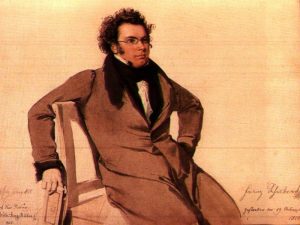
On October 19, 1814 – 206 years ago today – Franz Schubert composed his first masterwork, the song Gretchen am Spinnrade – “Gretchen at the Spinning Wheel” – for solo voice and piano, on a text by Johann von Goethe. Schubert was 17 years old.
It is an enduring and, in the end, unanswerable question: how many songs did Franz Schubert compose? It’s not that various sources haven’t tried to answer the question. For example, according to volume twenty of the Schubert Gesamptausgabe (“complete edition”), a massive project completed in the 1890s, Schubert composed 603 songs. According to the Belgian musicologist and Schubert scholar Reinhard van Hoorickx (1918-1997), writing in his Thematic Catalog of Schubert’s Works: New Additions, Corrections and Notes (published in1976), Schubert composed 660 songs. Not to be outdone, the English Schubert scholar, Maurice John Edwin Brown writing in his Essays on Schubert (Macmillan, 1966), claims that Schubert composed 708 songs. FYI, in a lecture I gave at San Francisco’s Herbst Theater on February 25, 2003 entitled “Schubert: On the Wings of His Songs” I indicated that he had composed 637 songs. (I know I wouldn’t have made that number up, but presently, I can’t for the life of me figure out where I came up with it.)
Most sources simply play it safe, indicating that Schubert composed “over 600 songs” or “over 610 songs” or over whatever number of songs.
The discrepancy in numbers arises from what should or should not be counted as being a “Schubert song”. For example, Schubert left a large number of songs incomplete, many of which have since been completed by others, published and recorded as being Schubert’s own. Should these be counted? We know of a number of Schubert’s songs (a small number, thankfully) that were indeed written but have since been lost. Should these be counted? Should we count only songs for solo voice and piano, or might we additionally count songs for solo voice and chorus, vocal duets accompanied by piano, and songs for solo voice accompanied by instruments other than piano? How about different versions of the same song? Writes Schubert scholar John Reed:
“Schubert was in the habit of writing out copies of his favorite songs for his friends, usually from memory, and he did not hesitate to vary the details or the key when it suited his purpose or theirs.”
Well: how “different” must such a copy be before it can be considered a different song?
Such, then, are the challenges in attempting to come up with a definitive number, and why I, for myself, will never again say “Schubert composed 637 songs”.
Here’s what I can say.
The earliest surviving complete song for voice and piano by Franz Schubert is entitled Hagars Klage (“Hagar’s Lament”), on a text by Clemens August Schücking (1759-1790).It is inscribed as having been completed on March 30, 1811, when Schubert was 14 years old.
He completed his last song in mid-October 1728, just weeks before his death on November 19. That song is entitled Die Taubenposte (“The Pigeon Post”), on a text by Johann Gabriel Seidl (1804-1875). This song was erroneously appended as the fourteenth and final song to a set of songs Schubert had just completed on texts by Ludwig Rellstab and Heinrich Heine. The Rellstab/Heine set is entitled Schwanengesang (meaning “Swan Song”), and whether or not it was right to include Die Taubenposte in Schwanengesang it was certainly appropriate, as “The Pigeon Post” was indeed Schubert’s “swan song” as a composer of songs.
It is difficult to overstate the importance song writing played in Schubert’s development, and impossible to overstate the importance of Schubert’s songs in establishing the genre of German Kunstlieder (meaning “art songs”). … Continue reading, only on Patreon!
Become a Patron!Listen on the Music History Monday Podcast
Podcast: Play in new window
Subscribe: Apple Podcasts | Spotify | Pandora | iHeartRadio | RSS | More
